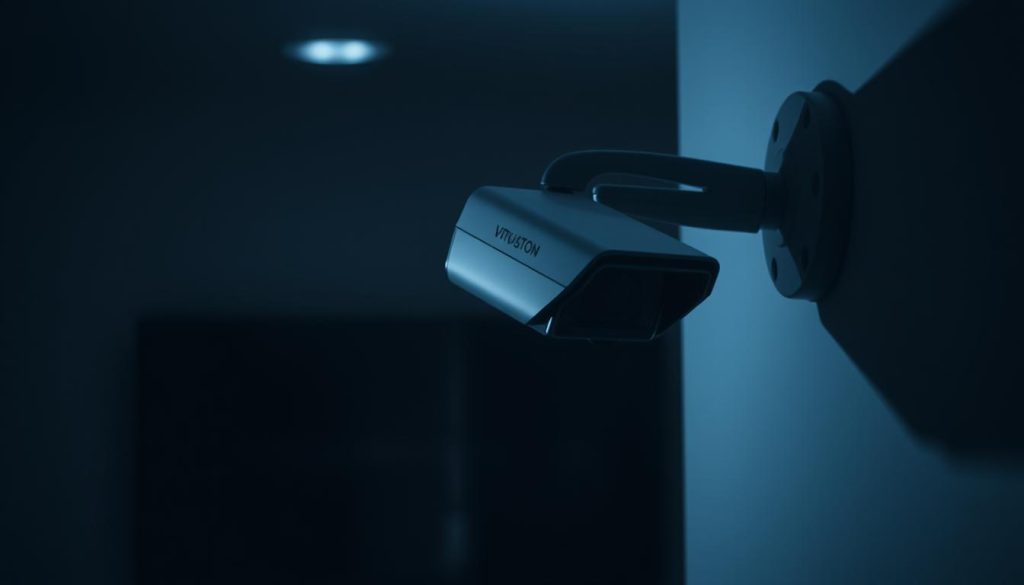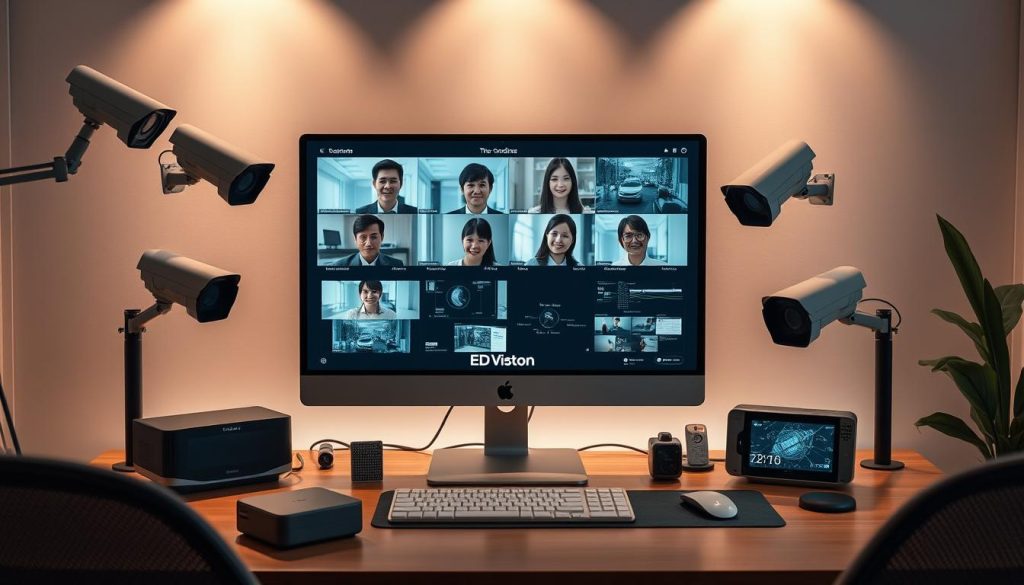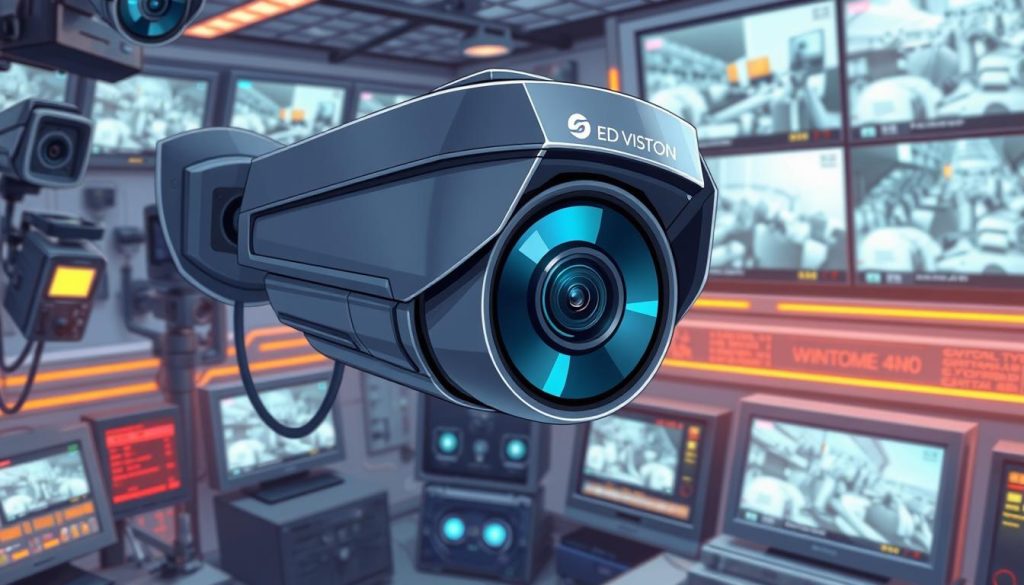Ever wondered if CCTV cameras can record when they’re turned off? This question makes us think about how these systems work. They seem to operate even without a power source. Let’s look into how CCTV cameras record and clear up some myths about their use.
Most CCTV cameras need power to record. When they’re off, they don’t capture any footage. To get the full picture, let’s dive into how these systems work and what people often believe about them.
Key Takeaways
- The majority of real security cameras do not feature blinking red lights, unlike fake models.
- Traditional wireless security cameras often require cables for power supply.
- Modern security cameras can have standby modes that allow for some operation.
- Batteries can power cameras if unplugged, as long as they’re fully charged.
- Backup power solutions are key for keeping surveillance going during outages.
- A camera that’s physically turned off usually doesn’t record, unless it has a backup feature.
- It’s vital to follow the manufacturer’s instructions to understand how a camera works.
If you want to learn more about the latest CCTV solutions and offers, contact ED Viston today at +65 8313 4578.
Understanding CCTV Camera Basics
CCTV camera basics cover Closed-circuit television technology and its key role in today’s surveillance systems. These cameras are used worldwide to boost security in homes and businesses. They combine lenses, sensors, and recording devices to meet various security needs.
There are many types of monitoring device features for different places and needs:
- Dome CCTV Cameras: Great for indoor and outdoor use in places like shops, restaurants, and hotels.
- Bullet CCTV Cameras: Often used as a visible warning in manufacturing and property management.
- C-Mount CCTV Cameras: Have detachable lenses, good for monitoring utilities and logistics.
- PTZ Pan Tilt & Zoom Cameras: Allow remote viewing and cover big areas, perfect for retail.
- Day/Night CCTV Cameras: Work well in low light, great for outdoor areas with changing light.
- Infrared/Night Vision CCTV Cameras: Work best in complete darkness, ideal for banks and sensitive spots.
- Network/IP CCTV Cameras: Let you access footage online from anywhere, handy for business owners.
- Wireless CCTV Cameras: Easy to install and look discreet, good for places that care about looks.
- High Definition (HD) CCTV Cameras: Offer clear images, important for places where theft is a big worry.
Statistics show the importance of CCTV surveillance. The British Security Industry Association found 4 to 5.8 million CCTV cameras in the UK by 2015. These cameras use about 4 to 6 watts of electricity daily, making them efficient. A 500 GB storage can hold about 18 days of video.
Most CCTV systems don’t record sound, but some advanced ones do. This makes them even better at watching over places.
Knowing these basics helps us see how important CCTV cameras are for keeping places safe. If you want to improve your security or explore new options, call ED Viston today at +65 8313 4578. They can tell you about the latest CCTV solutions and deals.
How CCTV Cameras Operate in Different Modes
CCTV cameras work in different modes to improve security and surveillance. It’s key to know these modes to fully understand how they work.
Real-time monitoring is a main mode. It sends images to a central point over a closed network. This lets people watch their property live. The option for remote viewing makes it easy to check on places from anywhere.
Recording modes are vital for keeping data safe. Continuous recording captures everything all the time. Motion-activated recording saves space by only recording when there’s movement. Each method affects how well the system works and how much data it needs.
Most cameras need electricity to work right. Without it, even the best cameras stop working. Some cameras have backup batteries and storage to keep recording when there’s no power. But, these batteries only last so long.
Places with backup power, like generators, keep CCTV cameras running. Important places, like hospitals, often use Uninterruptible Power Supplies (UPS) or generators too.
Systems that need the internet to work often need special backup systems to keep going during power outages. Using the latest technology, like 4K UHD Continuous Recording, makes surveillance clearer and better.
Features like infrared for night vision or status LED indicators help choose good surveillance. Always check the warranty when buying security gear to make sure it’s quality.
In short, knowing how CCTV cameras operate in different modes is key to understanding their role in surveillance. If you want to boost your security, call ED Viston today at +65 8313 4578. They offer the latest CCTV solutions and deals.
Power Requirements for CCTV Cameras
Knowing the CCTV power requirements is key for top security camera performance. Various power sources are critical for closed-circuit television technology. They decide how and when cameras can capture footage.
Old CCTV systems use standard electrical wiring. But, they might not work when power goes out, leaving gaps in surveillance. New systems with power over Ethernet (PoE) offer both power and data in one cable. This makes setup easier and more reliable.
Battery backup solutions have changed how CCTV systems work. Cameras with battery backup keep recording even when power is out. For example, the Reolink Altas PT Ultra camera runs for 12 hours a day. It can last up to 8 days on one charge. This shows how important reliable power is.
| Power Source Type | Operating Duration | Cost Estimate |
|---|---|---|
| Battery Backup CCTV | 12 hours daily, up to 8 days on charge | Varies |
| UPS (Standalone) | Continuous during outages | About $30 |
| UPS (Multiple channels) | Continuous during outages | Over $100 |
| Solar-Powered Systems | Up to 3 days without sunlight | Varies |
Businesses and places often get hit by crime when power goes out. This makes it vital to have cameras that never stop working. Many cameras now have two power sources to keep recording even when power is lost. This helps keep places safe and deters crime.
Connecting CCTV cameras to mobile devices can be a good backup when there’s no internet. Also, using solar batteries can help in areas without electricity. This makes sure surveillance works no matter what.
For more info on CCTV solutions, call ED Viston today at +65 8313 4578.
Can CCTV Cameras Record When Switched Off?
It’s important to know how CCTV systems work for good security. People often wonder, Can CCTV cameras record when they are switched off? The answer is no. They stop recording when power is lost. This clears up any confusion about their status during outages.
Common Misconceptions About Camera Operation
Many think security cameras can record without power. For example, dummy cameras have blinking red lights. This makes some think all cameras with lights can record, even when off. But, real CCTV cameras usually don’t have blinking lights.
Some cameras with blue lights might be recording. But not all have visible signs. So, whether a camera has lights or not can change how people think it works.
Technical Limitations of CCTV Systems
CCTV systems have technical limits that affect how they record. Wired systems need constant power to work. If power goes out, they stop recording.
But, IP cameras with battery backups can keep going during outages. This shows why a steady power supply is key for security. Also, cloud storage needs an internet connection to work. Knowing these points helps pick the right system for your needs.
Looking to boost your security with CCTV? Call ED Viston at +65 8313 4578. They offer the latest CCTV solutions and special deals.
Surveillance Camera Functionality Explained
The world of surveillance cameras is huge and always changing. Over 1 billion cameras are installed worldwide for security. These cameras have advanced features that make them key for safety in many places.
Technology has improved video quality, how long it can record, and storage. Modern CCTV systems have motion detection and advanced analytics. These features record only when there’s movement, saving space and spotting threats better.
Professional monitoring is vital for getting the most out of surveillance cameras. Experts watch live feeds and recorded videos, giving important clues during security issues. In stores, CCTV cameras can cut crime by more than 50%, scaring off thieves and shoplifters.
Features like night vision let cameras work well in the dark. About 80% of IP cameras have red lights to show they’re recording. Knowing this helps tell real security systems from fake ones, which don’t have blinking lights.
Security experts can spot patterns and weaknesses by analyzing footage. This helps make better security plans. Want to boost your security? Call ED Viston at +65 8313 4578 to learn about the newest CCTV options and deals.
Recording Footage in Standby Mode
CCTV cameras can work in different ways, like standby mode. This mode means the system is on but not recording. It saves energy and waits for any events to start recording.
Many CCTV systems have motion detection. This feature starts recording when it sees movement. It turns idle time into useful surveillance data. A red LED light shows when the camera is watching activity.

Users of advanced security systems can check their cameras with apps. These apps show if the camera is recording or in standby. Checking regularly helps catch any missed footage.
Technical problems, like cable issues, can stop recording. Knowing how to set up your CCTV system is key. Regular checks keep your camera ready to capture important moments.
Optimizing standby mode recording boosts your surveillance. The right settings and monitoring create a strong security system. It meets your specific needs.
For help or to see the latest CCTV options, call ED Viston at +65 8313 4578 today.
Backup Power Solutions for CCTV Cameras
Keeping CCTV cameras running during power outages is key for good surveillance. There are many backup power solutions for CCTV cameras. These include generator power and battery backup, both important for security.
Generator and UPS Systems
Generators can be a reliable power source during long outages. They start automatically when power goes out. But, it’s important to consider the cost and if it’s worth it for your needs.
Uninterruptible Power Supplies (UPS) work differently. They give short-term power to important things like cameras and monitors. A UPS can last about 5 hours, depending on the battery and camera type. It costs around $100, making it a good choice for short outages.
Choosing a UPS involves looking at several things. You need to think about how far the power will go, how much power you need, and if it protects against surges. Connecting it to key parts helps keep your surveillance running smoothly.
Battery Backup Options
Battery backup is great for keeping surveillance systems going during blackouts. Cameras like the Reolink Altas PT Ultra can run for up to 12 hours a day. They can last 8 days on one charge. Plus, many support solar panels for a green solution.
Some cameras, like the Reolink Go Plus, work without electricity or Wi-Fi. This lets you watch your property even when there’s no power. Many also send alerts when the battery is low, helping you manage power better.
Battery backup systems keep your surveillance going 24/7, even in tough conditions. You can also set up solar-powered systems for more resilience. Using UPS and generators means your security is always on, day and night.
For the latest on CCTV solutions and deals, call ED Viston today at +65 8313 4578.
Remote Access to CCTV Recordings
Remote access to CCTV recordings is key for today’s surveillance systems. It lets users watch their properties from anywhere, boosting security and peace of mind. Thanks to tech advances, users can easily view footage on their devices.
Many CCTV cameras work fine without the internet. This is great for rural areas with limited internet and power. Users often choose not to connect their systems online for security reasons. This shows the need for strong local storage.
Without internet, you can monitor 24/7 and save footage locally. But, you can’t access footage remotely or get cloud backups. The variety of CCTV cameras means you can pick the right one for your needs.
CCTV systems can prevent crime, give peace of mind, and help in legal cases. They’re not just for watching; they’re a key part of a solid security plan. Getting professional help with installation and upkeep can make your system work better.
Want to improve your security? Call ED Viston at +65 8313 4578 today. They’ll help you find the best CCTV solutions and deals.

Legal Implications of CCTV Surveillance
CCTV surveillance brings up many legal issues for both people and companies. In Singapore, knowing the CCTV laws is key to follow privacy and data protection rules. Footage from CCTV cameras is seen as personal info, so it must be handled carefully.
Companies using CCTV systems need to think about the legal side of things. Getting consent from people can be hard, like in public places. Doing a legitimate interests assessment (LIA) helps show why CCTV is needed. It also helps with a bigger Data Protection Impact Assessment (DPIA).
Keeping recorded footage safe is very important. Systems must protect the data to keep it whole and accessible. Also, it’s important to check if CCTV is really needed and if it’s the right amount. Looking at less invasive options before using CCTV is a good idea.
CCTV cameras are often used in workplaces to boost security and watch how things are done. The rules for using these systems help keep businesses safe while also respecting employees’ privacy and dignity.
For more info on CCTV solutions and deals, call ED Viston today at +65 8313 4578.
Conclusion
Understanding CCTV recording capabilities is key for anyone looking into surveillance systems. We’ve shown that CCTV cameras can’t record when they’re off. They need a constant power supply to work well.
Features like status LEDs can tell if a camera is on. But, real security cameras don’t flash red lights like fakes do.
For better security, consider systems like the Reolink Altas PT Ultra. It records continuously and has a long battery life. This shows why choosing a reliable system is important.
By picking quality cameras from trusted brands, you get the best performance. This brings peace of mind.
If you want to check out the latest CCTV options, call ED Viston at +65 8313 4578. Our team is here to help you find the best security solutions for your needs.
FAQ
Can CCTV cameras record when they are turned off?
What are the basic components of a CCTV camera?
What is the difference between continuous recording and motion-activated recording?
What power sources are commonly used for CCTV cameras?
Are there technical limitations associated with CCTV systems?
Can modern surveillance cameras record in standby mode?
What backup power solutions are available for CCTV systems?
How can I access my CCTV recordings remotely?
What are the legal considerations for using CCTV cameras?
Source Links
- https://reolink.com/blog/how-to-tell-if-a-security-camera-is-on/?srsltid=AfmBOoqh_PqzjI2ZLFkZqq0v4IZSruJ-YNPKjLocpbNz5clG7HGzAoBg
- https://networkcablingirvine.com/can-cctv-cameras-record-if-turned-off-security-camera-power-recording-info-oc-wiring/
- https://alfred.camera/blog/what-happens-if-you-unplug-a-security-camera/
- https://schoolwatch.co.uk/101-cctv-questions-answered-what-didnt-you-know-about-cctv/
- https://www.businesswatchgroup.co.uk/types-of-cctv-cameras-the-complete-guide/
- https://www.precisionsecurity.com.au/do-cctv-cameras-work-without-electricity
- https://reolink.com/blog/how-to-tell-if-a-security-camera-is-on/?srsltid=AfmBOorcI9AD0cpOlfrCgCiTvFgN5wZi6gjX_-mjciwK0r6cHnGi0yc9
- https://reolink.com/blog/do-security-systems-work-when-power-is-out/?srsltid=AfmBOopslxaZM7RHRhw8VbrvJrI8bMmizGALtXy4m7mSkjavo1cqnkKz
- https://microsegur.com/en/how-does-my-security-system-still-work-in-a-power-outage/
- https://reolink.com/blog/how-to-tell-if-a-security-camera-is-on/?srsltid=AfmBOoqPtXQR98-pcztTQhiPYgbmojmlLlJ3la_52G5VH9Uf5sVGwEuM
- https://mobilecctvtrailerstockton.com/will-cctv-camera-record-when-turned-off/
- https://sirixmonitoring.com/blog/what-is-cctv-monitoring-and-how-does-it-work/
- https://reolink.com/blog/how-to-tell-if-a-security-camera-is-on/?srsltid=AfmBOopHy4ApMpFt2UhcS1jxN7KiiG5D98MbZ9lfkNm2fmum9eGip3bk
- https://alfred.camera/blog/how-to-tell-if-a-security-camera-is-on/
- https://forum.yitechnology.com/t/continuous-recording-gone/389
- https://reolink.com/blog/do-security-systems-work-when-power-is-out/?srsltid=AfmBOopUk-W7CXxRPPYjMgI-O_c_LLq3MUcIfQ_Bqvd8UlgXW_pvD0vM
- https://reolink.com/blog/battery-backup-security-camera-for-home/?srsltid=AfmBOoqEYulp6dRcAqvQmpbt-taQJXSEx39pSCTb9jgsCRAA9C3AXbLy
- https://www.caldersecurity.co.uk/can-cctv-cameras-work-without-the-internet/
- https://www.caughtoncamera.net/news/common-cctv-problems-fix/
- https://www.moglix.com/articles/know-more-about-cctv-cameras-best-uses-and-benefits?srsltid=AfmBOoqibfCWLRmugo06d7p9vfPscTLkTeUrul1TC_H_guysJlZ_UZZg
- https://ico.org.uk/for-organisations/uk-gdpr-guidance-and-resources/cctv-and-video-surveillance/guidance-on-video-surveillance-including-cctv/how-can-we-comply-with-the-data-protection-principles-when-using-surveillance-systems/
- https://network-data-cabling.co.uk/blog/cctv-employees-rights/
- https://www.gamingtechlaw.com/2019/12/cctv-cameras-data-protection-law/
- https://reolink.com/blog/how-to-tell-if-a-security-camera-is-on/?srsltid=AfmBOor4jHSns6QsEEg_u3MH5u0ahB62MgOn1BicGP-HZelLyXczBk6a
- https://reolink.com/blog/what-happens-if-you-unplug-a-security-camera/?srsltid=AfmBOooSHlfCYsSDpiFG2Zv486jeis-WcDZKbUlDoPO7NxQoff9JBI78

